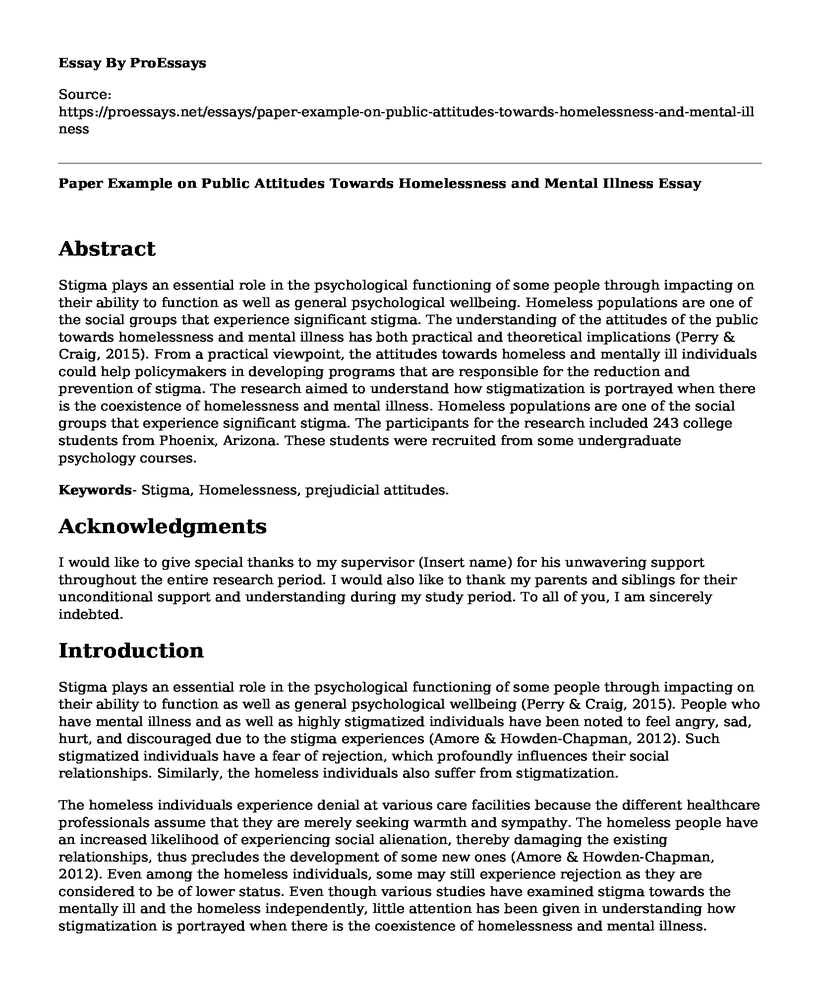Abstract
Stigma plays an essential role in the psychological functioning of some people through impacting on their ability to function as well as general psychological wellbeing. Homeless populations are one of the social groups that experience significant stigma. The understanding of the attitudes of the public towards homelessness and mental illness has both practical and theoretical implications (Perry & Craig, 2015). From a practical viewpoint, the attitudes towards homeless and mentally ill individuals could help policymakers in developing programs that are responsible for the reduction and prevention of stigma. The research aimed to understand how stigmatization is portrayed when there is the coexistence of homelessness and mental illness. Homeless populations are one of the social groups that experience significant stigma. The participants for the research included 243 college students from Phoenix, Arizona. These students were recruited from some undergraduate psychology courses.
Keywords- Stigma, Homelessness, prejudicial attitudes.
Acknowledgments
I would like to give special thanks to my supervisor (Insert name) for his unwavering support throughout the entire research period. I would also like to thank my parents and siblings for their unconditional support and understanding during my study period. To all of you, I am sincerely indebted.
Introduction
Stigma plays an essential role in the psychological functioning of some people through impacting on their ability to function as well as general psychological wellbeing (Perry & Craig, 2015). People who have mental illness and as well as highly stigmatized individuals have been noted to feel angry, sad, hurt, and discouraged due to the stigma experiences (Amore & Howden-Chapman, 2012). Such stigmatized individuals have a fear of rejection, which profoundly influences their social relationships. Similarly, the homeless individuals also suffer from stigmatization.
The homeless individuals experience denial at various care facilities because the different healthcare professionals assume that they are merely seeking warmth and sympathy. The homeless people have an increased likelihood of experiencing social alienation, thereby damaging the existing relationships, thus precludes the development of some new ones (Amore & Howden-Chapman, 2012). Even among the homeless individuals, some may still experience rejection as they are considered to be of lower status. Even though various studies have examined stigma towards the mentally ill and the homeless independently, little attention has been given in understanding how stigmatization is portrayed when there is the coexistence of homelessness and mental illness.
Research Objective
The main objective of this research was to understand how stigmatization is portrayed when there is the coexistence of homelessness and mental illness.
Conceptual Framework
Homeless populations are one of the social groups that experience significant stigma. The understanding of the attitudes of the public towards homelessness and mental illness has both practical and theoretical implications (Perry & Craig, 2015). From a practical viewpoint, the attitudes towards homeless and mentally ill individuals could help policymakers in developing programs that are responsible for the reduction and prevention of stigma (Amore & Howden-Chapman, 2012).
Theoretically, various studies have been conducted indicating a relationship between the stigmatization of the homeless and the mental individuals (Amore & Howden-Chapman, 2012). Research has often shown that people often hold prejudicial attitudes towards the homeless and mentally ill individuals.
References
Amore, K., & Howden-Chapman, P. L. (2012). Mental health and homelessness. International Encyclopedia of Housing and Home, 268-273.
Perry, J., & Craig, T. K. (2015). Homelessness and mental health. Trends in Urology & Men's Health, 6(2), 19-21. Retrieved from https://doi.org/10.1002/tre.445
Cite this page
Paper Example on Public Attitudes Towards Homelessness and Mental Illness. (2023, Jul 21). Retrieved from https://proessays.net/essays/paper-example-on-public-attitudes-towards-homelessness-and-mental-illness
If you are the original author of this essay and no longer wish to have it published on the ProEssays website, please click below to request its removal:
- Potential Risk Areas for Terrorism Emergency Planning - Research Paper Example
- The Effects Maternal Depression on the Development of Young Children: Essay Sample
- Criticisms Leveled against Positive Psychology - Essay Sample
- Analysis of the Patriot Games Book Paper Example
- Essay Example on Self-Monitoring Skills: Regulating Emotions for Better Relationships
- Essay Example on Immigration: A Crucial Debate for Building Nations
- Research Paper on Biological Methods Used to Treat Schizophrenia







